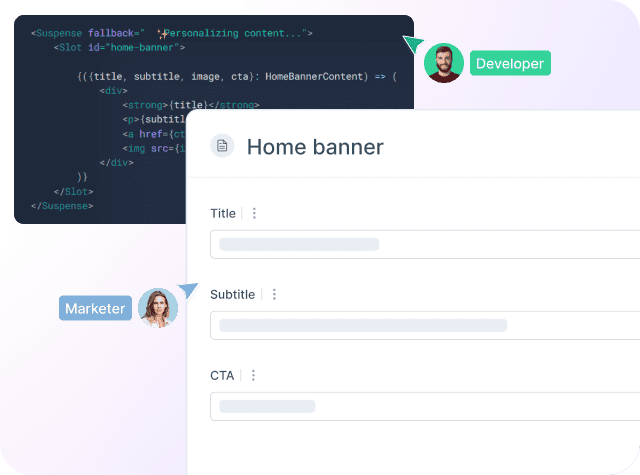Content management systems come in many shapes and sizes, each designed to serve different use cases, industries, and teams.
If you're a developer or a product manager seeking to understand the different types of CMS available, this article will help you decide which approach best suits your needs by exploring their shared features, highlighting their distinctions, and providing insights into their pros, cons, and top vendors.
There are basically six major CMS categories: enterprise, e-commerce, media and publishing, component-based, documentation and knowledge base, and marketing website builders.
Common features across CMS types
While different types of CMS platforms cater to unique needs, they all share some fundamental capabilities:
-
Content creation and management
Enables users to create, edit, and organize content easily.
-
User roles and permissions
Allows different levels of access for contributors, editors, and administrators.
-
Version control and collaboration
Provides tools for tracking content changes and facilitating teamwork.
-
SEO & performance optimization
Includes features for improving search visibility and loading speeds.
-
Integration capabilities
Supports connections with third-party tools like CRMs, marketing automation, and analytics.
-
Security and compliance
Ensures data protection and compliance with industry standards.
Despite these shared functionalities, each CMS type is designed for a distinct use case, audience, and business need.
Comparing CMS types: what sets them apart?
Some CMS platforms are built for scale, while others prioritize usability or flexibility. Enterprise CMS platforms focus on security, workflow automation, and governance, making them ideal for large corporations and organizations that handle vast amounts of content. E-commerce CMS solutions, on the other hand, are tailored for managing product catalogs, integrating shopping carts, and processing transactions.
For media-heavy businesses like news organizations and digital magazines, publishing CMS platforms provide robust editorial workflows, multi-channel content distribution, and monetization tools. Companies seeking high levels of personalization and experimentation benefit from component-based CMS platforms, which allow for modular content assembly and A/B testing.
On the documentation side, knowledge base CMS platforms help businesses organize structured content for technical documentation, FAQs, and internal wikis. Lastly, marketing-focused website builders prioritize ease of use, offering drag-and-drop design, built-in SEO tools, and lead-generation capabilities for small businesses and marketing teams.
The most used CMS types
Here is an overview of the six main CMS types.
Enterprise CMS
Enterprise CMS platforms are built to handle high traffic, extensive content, and advanced governance requirements. They often integrate deeply with enterprise software (ERP, CRM, DAM) and provide workflow automation for complex operations.
- Best for: Large organizations, corporations, and government agencies.
- Primary users: IT teams, content strategists, digital marketing teams.
- Examples: Sitecore, Adobe Experience Manager (AEM), Salesforce CRM.
E-commerce CMS
E-commerce CMS solutions enable businesses to build and manage online stores efficiently. They include product catalog management, inventory tracking, customer accounts, shopping cart integration, payment processing, and seamless checkout experiences.
- Best for: Online retailers and brands selling products or services online.
- Primary users: E-commerce managers, marketers, developers.
- Examples: Shopify, Magento, BigCommerce.
Media and publishing CMS
Publishing-focused CMS platforms prioritize content-heavy websites with high-frequency updates, supporting multimedia formats and ad revenue models. They usually provide multi-channel publishing, editorial workflows, and monetization tools.
- Best for: News organizations, magazines, and digital publishers.
- Primary users: Journalists, editors, and content teams.
- Examples: WordPress VIP, Ghost, Arc XP.
Component-based CMS
Unlike traditional page-based CMS, component-based systems allow teams to assemble reusable content blocks, enabling greater personalization and AB testing. The modular content components simplify the creation of dynamic user experiences and allow integration with design systems.
- Best for: Companies prioritizing personalization, experimentation, and flexibility.
- Primary users: Product teams, UX designers, growth marketers.
- Examples: Croct, Storyblok, Hereto.
Croct helps product teams scale experimentation and personalization without over-relying on developers.

Documentation and knowledge base CMS
These platforms help create and manage knowledge bases, API docs, and internal wikis to support customer education and reduce support tickets. Their key differentiators are the structured documentation, searchability, and user self-service tools.
- Best for: SaaS companies, support teams, and technical writers.
- Primary users: Technical writers, customer success teams, product teams.
- Examples: Docusaurus, ReadMe, Confluence.
Marketing-focused CMS
Marketing-focused CMS platforms, commonly known as website and landing page builders, prioritize ease of use, providing non-technical users with intuitive website-building and content marketing capabilities. Most of them provide drag-and-drop design, built-in SEO, and lead generation tools.
- Best for: Marketers, small businesses, and solopreneurs.
- Primary users: Marketing teams, content creators, business owners.
- Examples: Webflow, HubSpot CMS, Wix.
Which CMS is right for you?
Choosing the right CMS depends on your business needs, team expertise, and long-term growth strategy. If you’re an enterprise with complex workflows, an enterprise CMS makes sense. If your focus is e-commerce, go with an e-commerce CMS. For digital publishers, a media CMS is ideal, while SaaS companies might benefit more from a component CMS. Technical businesses can streamline support with a documentation CMS, and marketers may find website builders the easiest way to manage content.
By understanding these categories and their pros and cons, you can select the best CMS to power your digital experiences effectively.